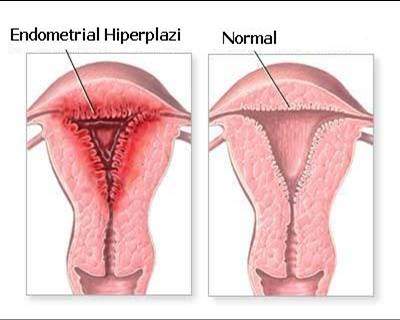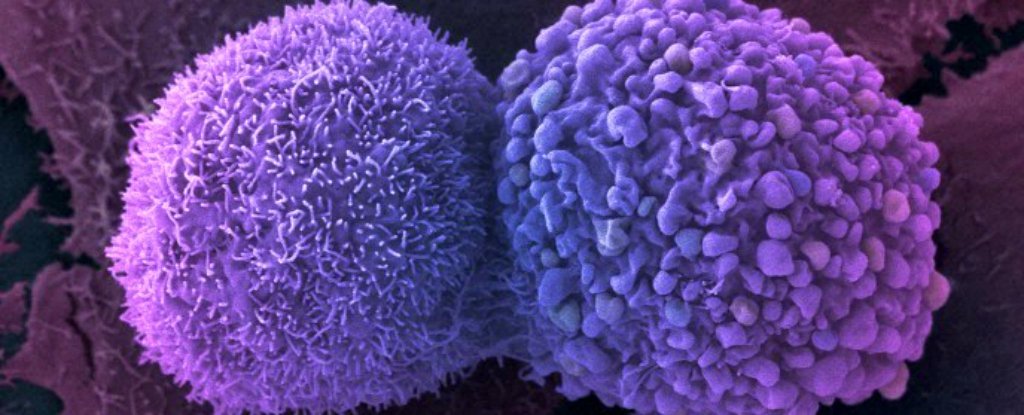Endometrial cancer is a cancer that arises from the endometrium (the lining of the uterus or womb). It is the result of the abnormal growth of cells that have the ability to invade or spread to other parts of the body.

Symptoms:
- Vaginal bleeding after menopause :Abnormal vaginal bleeding or discharge, which occurs in nine out of 10 women with endometrial cancer. Before menopause, this means unusually heavy irregular menstrual periods or bleeding between periods. After a woman enters menopause, this means any vaginal bleeding, unless she is on hormone replacement therapy (HRT). Even though HRT may cause vaginal bleeding in postmenopausal women,
- Difficult or painful urination.
- An enlarged uterus, detectable during a pelvic exam.
- Pain during intercourse.
- Unexpected weight loss.
- Weakness and pain in the lower abdomen, back, or legs.
Causes:
The exact cause of endometrial cancer is unknown. Some experts suspect that high levels of estrogen might be responsible for this disease. Progesterone and estrogen are female sex hormones produced in the ovaries. When the balance of these two hormones changes, the endometrium can change. Research has shown that increased estrogen without corresponding increased progesterone can thicken the endometrium and potentially increase the likelihood of cancer.
The genetic mutation turns normal, healthy cells into abnormal cells. Healthy cells grow and multiply at a set rate, eventually dying at a set time. Abnormal cells grow and multiply out of control, and they don’t die at a set time. The accumulating abnormal cells form a mass (tumor). Cancer cells invade nearby tissues and can separate from an initial tumor to spread elsewhere in the body (metastasize).
Risk Factors:
Menustration :
More years of menstruation.
Starting menstruation at an early age — before age 12 — or beginning menopause later increases the risk of endometrial cancer. The more periods you’ve had, the more exposure your endometrium has had to estrogen.
Never having been pregnant. Women who have never been pregnant have a higher risk of endometrial cancer than do women who have had at least one pregnancy.
Endometrial cancer occurs most often in women who have undergone menopause.
Obesity : Being obese increases your risk of endometrial cancer. This may occur because excess body fat alters your body’s balance of hormones.
Hormone therapy for breast cancer :Women with breast cancer who take the hormone therapy drug tamoxifen have an increased risk of developing endometrial cancer. If you’re taking tamoxifen, discuss this risk with your doctor. For most women, the benefits of tamoxifen outweigh the small risk of endometrial cancer.
An inherited colon cancer syndrome : Hereditary nonpolyposis colorectal cancer (HNPCC) is a syndrome that increases the risk of colon cancer and other cancers, including endometrial cancer. HNPCC occurs because of a gene mutation passed from parents to children.
How to Diagnose Endometrial Cancer :
Routine Blood Test
Pelvic Exam
Pap Smear Test
Transvaginal Ultrasound
Biopsy
Staging:
- Stage 1: Cancer is only in your uterus.
- Stage 2: Cancer is in your uterus and cervix.
- Stage 3: Cancer is also found outside your uterus and possibly in your pelvic lymph nodes, but not in your bladder or rectum
- Stage 4: Cancer has spread outside your pelvic area and might invade your rectum, bladder, and other parts of your body.
Prevention:
- Using oral contraceptives for at least one year may reduce endometrial cancer risk. The risk reduction is thought to last for several years after you stop taking oral contraceptives.
- Obesity increases the risk of endometrial cancer, so work to achieve and maintain a healthy weight.
- Exercise may reduce your risk of endometrial cancer. Add physical activity into your daily routine. Try to exercise 30 minutes most days of the week. If you can exercise more, that’s even better.
- Hormone replacement therapy to help control menopause symptoms.
- Taking a combination of estrogen and progestin can reduce this risk. Hormone therapy carries other risks, such as a possible increase in the risk of breast cancer, so weigh the benefits and risks.
FOR MORE INFORMATION – EXPERT SECOND OPINION
TREATMENT PLAN AND DURATION
COST ESTIMATE
TELE-CONSULTATION
APPOINTMENT BOOKING
PROVIDE YOUR DETAILS THROUGH THE FORM OR CLICK ON WHATSAPP BUTTON




